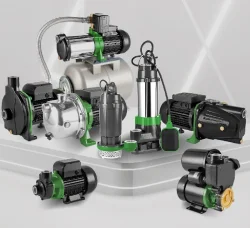Understanding Different Types of Water Pumps and Their Applications
2024-09-29
Water pumps play a crucial role in many industries and households, helping move water from one place to another for a variety of purposes. From irrigation systems to household water supply, water pumps have become indispensable. With so many types of water pumps available, it can be challenging to determine which one suits your specific needs. In this blog, we’ll explore the most common types of water pumps and their applications.
1. Centrifugal Water Pumps
Centrifugal pumps are one of the most widely used types of water pumps, known for their simplicity and efficiency. These pumps work by converting rotational kinetic energy into hydrodynamic energy to move water through a spinning impeller. Centrifugal pumps are ideal for pumping large volumes of water at low pressure.
Applications:
- Irrigation systems for farms and gardens.
- Water supply in residential and commercial buildings.
- Dewatering and drainage systems.
- Industrial cooling systems.
Advantages:
- Cost-effective and low maintenance.
- Easy to operate.
- Suitable for continuous operation.
2. Submersible Water Pumps
Submersible pumps are designed to be placed underwater, typically in wells or tanks. These pumps are enclosed in a sealed housing that prevents water from entering the motor, making them suitable for deep water pumping.
Applications:
- Well water extraction.
- Sewage and wastewater pumping.
- Drainage systems for basements and flood-prone areas.
- Industrial uses such as mining or oil rigs.
Advantages:
- Efficient for deep water pumping.
- Quiet operation as they are submerged.
- Less prone to cavitation (air bubbles that reduce pumping efficiency).
3. Positive Displacement Pumps
Positive displacement pumps move water by trapping a fixed amount of fluid and forcing it through the pump. These pumps are known for their consistent flow rate and are ideal for high-pressure applications.
Applications:
- Industrial chemical processing.
- Metering and dosing applications.
- Food and beverage production.
- Hydraulic systems.
Advantages:
- Suitable for high-viscosity fluids.
- Consistent flow, regardless of pressure changes.
- Good for applications requiring precise dosing.
4. Booster Pumps
Booster pumps are designed to increase water pressure in low-pressure systems. They are often used in residential buildings, commercial establishments, and industrial facilities to improve water flow.
Applications:
- Residential water supply, especially in multi-story buildings.
- Commercial water systems for hotels, hospitals, and office buildings.
- Firefighting systems.
- Irrigation systems needing additional pressure.
Advantages:
- Improves water pressure in weak systems.
- Compact and easy to install.
- Reliable and efficient in maintaining consistent pressure.
5. Solar Water Pumps
Solar water pumps are becoming increasingly popular due to their energy-efficient operation. These pumps use solar panels to convert sunlight into electrical energy, which powers the pump. Solar pumps are commonly used in remote or off-grid areas where electricity is scarce.
Applications:
- Agricultural irrigation in rural areas.
- Livestock watering.
- Remote water supply systems.
- Environmental and wildlife water management.
Advantages:
- Eco-friendly and cost-effective over time.
- Can operate in areas without access to electricity.
- Low operational costs once installed.
Choosing the Right Water Pump
When selecting a water pump, consider the following factors:
- Flow Rate: How much water needs to be pumped? Large-scale applications, like irrigation, require high flow rates, while household systems may need lower rates.
- Pump Head: This refers to the height the pump can raise water. Deep wells require a pump with a high head, while shallow applications do not.
- Water Source: Consider whether the pump will need to handle clean water, dirty water, or chemicals. Some pumps, like submersible or sewage pumps, are better suited for handling debris or wastewater.
- Power Source: Choose a pump that matches the power source available in your area, whether it's electric, solar, or gasoline-powered.
Conclusion
Water pumps are essential for a wide range of applications, from irrigation and wastewater management to residential water supply. Understanding the different types of pumps and their capabilities is crucial to selecting the right one for your needs. By choosing the correct pump, you can ensure efficient water movement, reduced energy consumption, and long-lasting performance.



